[ad_1]
Chromebooks present an excellent alternative to Windows laptops, particularly for those seeking a highly affordable computing option. We’ve curated a list of the current top-performing Chromebooks for your consideration.
These budget-friendly laptops operate on ChromeOS rather than Windows, offering not only an enticing price point but also the advantage of a swift, user-friendly, and virus-resistant operating system. ChromeOS’s efficiency makes it an ideal choice for various users, including teenagers, grandparents, and students, given its simplicity and speed.
While advancements in hardware, such as the utilization of Mediatek chips, especially in Acer devices, contribute to improved performance, the notable progress lies in the software domain. ChromeOS has reached a level of maturity, and the integration of Android applications adds another layer of functionality. Google‘s ongoing development of its ecosystem, evident in Android 13, further enhances the synergy between Android and ChromeOS.
It’s essential, however, to carefully evaluate your specific needs. Chromebooks excel in tasks like light office work and media consumption but may not fulfill more demanding requirements. If essential software or peripherals are a priority, opting for an entry-level Windows PC might be a more suitable choice.
The Top Best Chromebooks to buy right now
The Acer Chromebook Plus 514 (CB514-3HT): A Top Choice Among Chromebooks
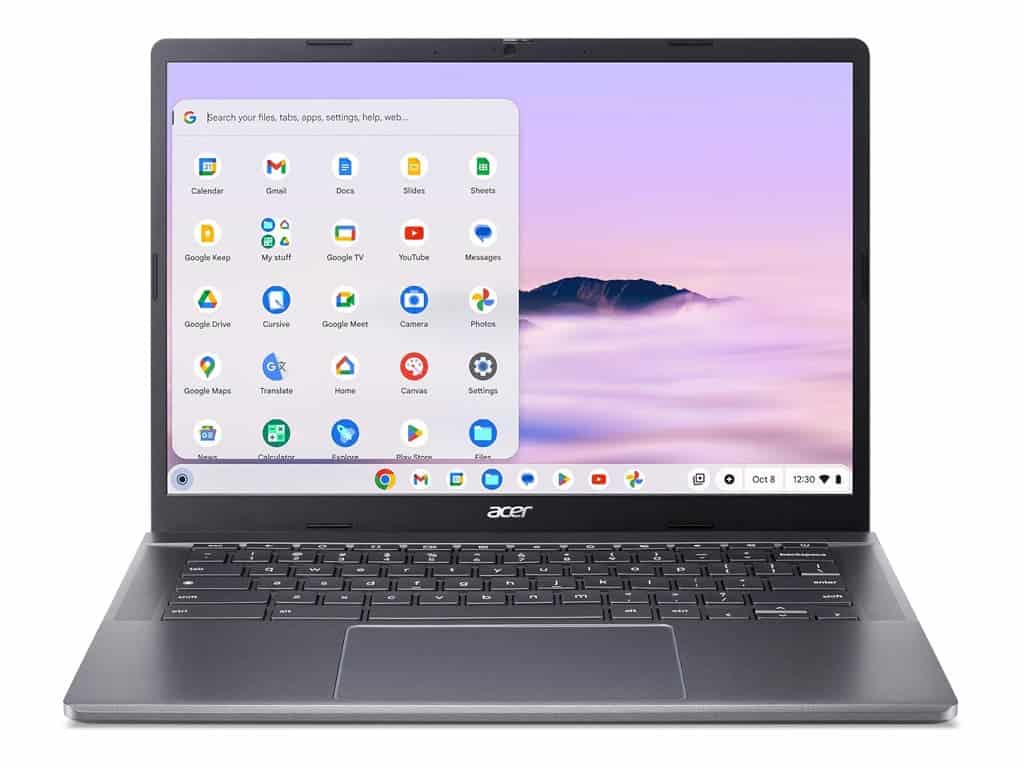
Acer’s latest Chromebook stands out as a well-balanced model, making it a highly recommended option for those seeking an affordable laptop, especially for students. Despite its 14-inch display, it maintains a compact and lightweight profile, tipping the scales at a mere 1.45 kg. Constructed predominantly from plastic, the chassis boasts a commendable finish, delivering an overall sense of quality. The generously sized and comfortable keyboard adds to the device’s appeal.
The screen upgrade to Full HD enhances the viewing experience, though it falls slightly short in brightness, making it less ideal for outdoor use. On the connectivity front, the Chromebook features two USB-C ports, a full-sized HDMI port, a USB A port, and a combo jack port.
Performance is a strong suit for the Acer Chromebook 514, equipped with an AMD Ryzen 3 7320C chip, 8 GB of RAM, and a spacious 256 GB SSD. This configuration elevates its capabilities to that of a conventional Windows PC. Chrome OS optimization is noteworthy, and the device boasts an impressive 10-hour battery life, enhancing its portability. Notably, Chrome OS has seen significant improvements, including the ability of Google Drive to synchronize Docs, Sheets, Slides, and Forms files locally, facilitating work without an internet connection.
In summary, the Acer Chromebook Plus 514 stands as one of the premier choices among Chromebooks. It excels for those with limited budgets and basic office requirements, making it a compelling option.
The Asus Chromebook C433: Your Portable Chrome Companion
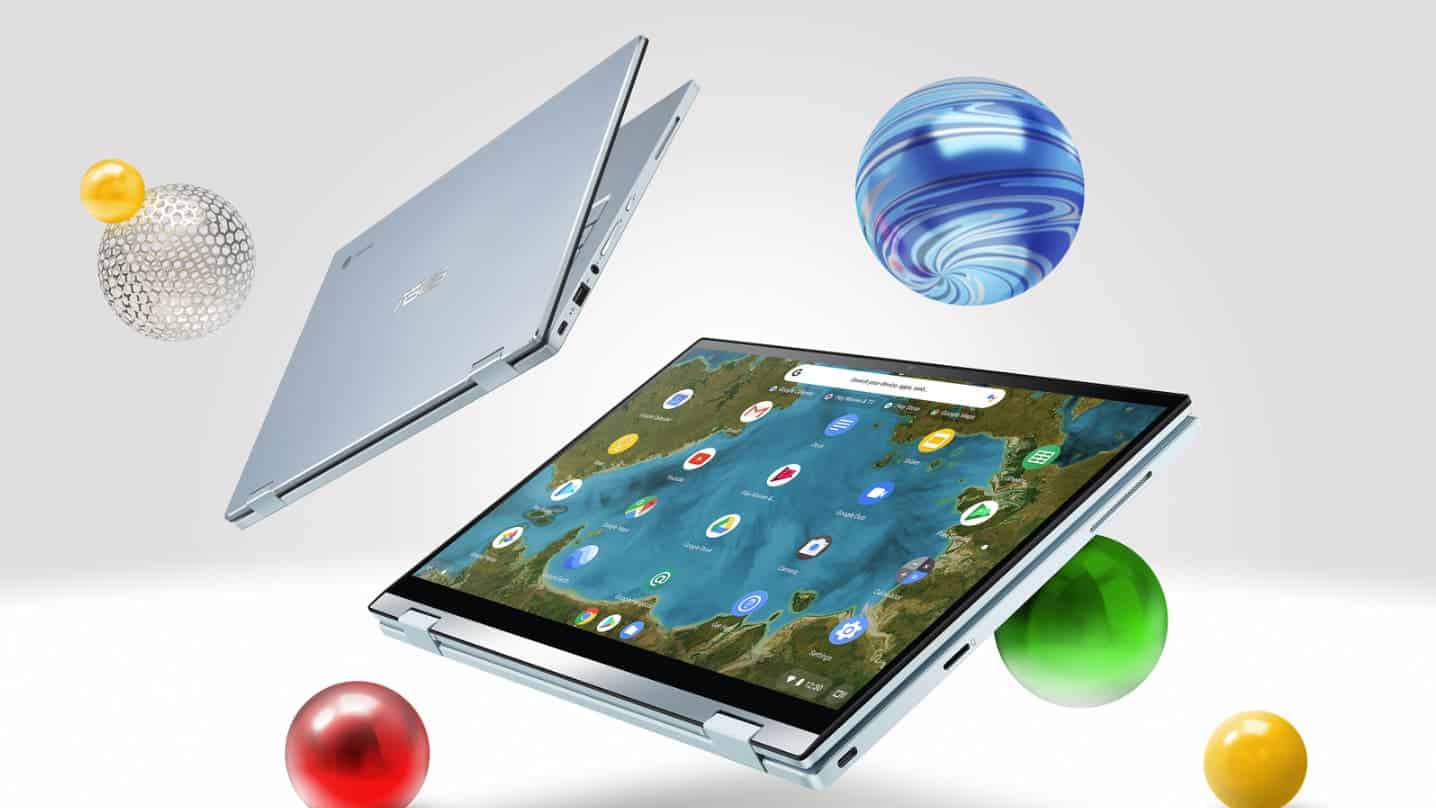
Embodying the simplicity inherent in many Chromebooks, the Asus model presents a sleek 2-in-1 design, making it highly portable with a mere two-centimeter thickness. Featuring a delightful 14-inch touchscreen with 360-degree rotatable hinges, it provides versatility along with a keyboard that caters to your preferences.
Under the hood, the Asus Chromebook C433 boasts an Intel Core m3-8100Y processor, complemented by 8GB of RAM and 128GB of internal storage. The available configurations cater to varying power needs. Connectivity options include two USB-C ports, one USB-A port, and a mini-jack port. While ChromeOS may have limitations in terms of performance, it proves sufficient for everyday office tasks.
In the battery department, the Asus Chromebook C433 is equipped with a 48 Wh battery, ensuring the device can endure a full day of office use. Regardless of the specific model you opt for, the Asus Chromebook C433 offers excellent value for money, making it a reliable daily companion.
For Budget-conscious Consumers: Acer Chromebook 314 2021 (CB314-1HT)
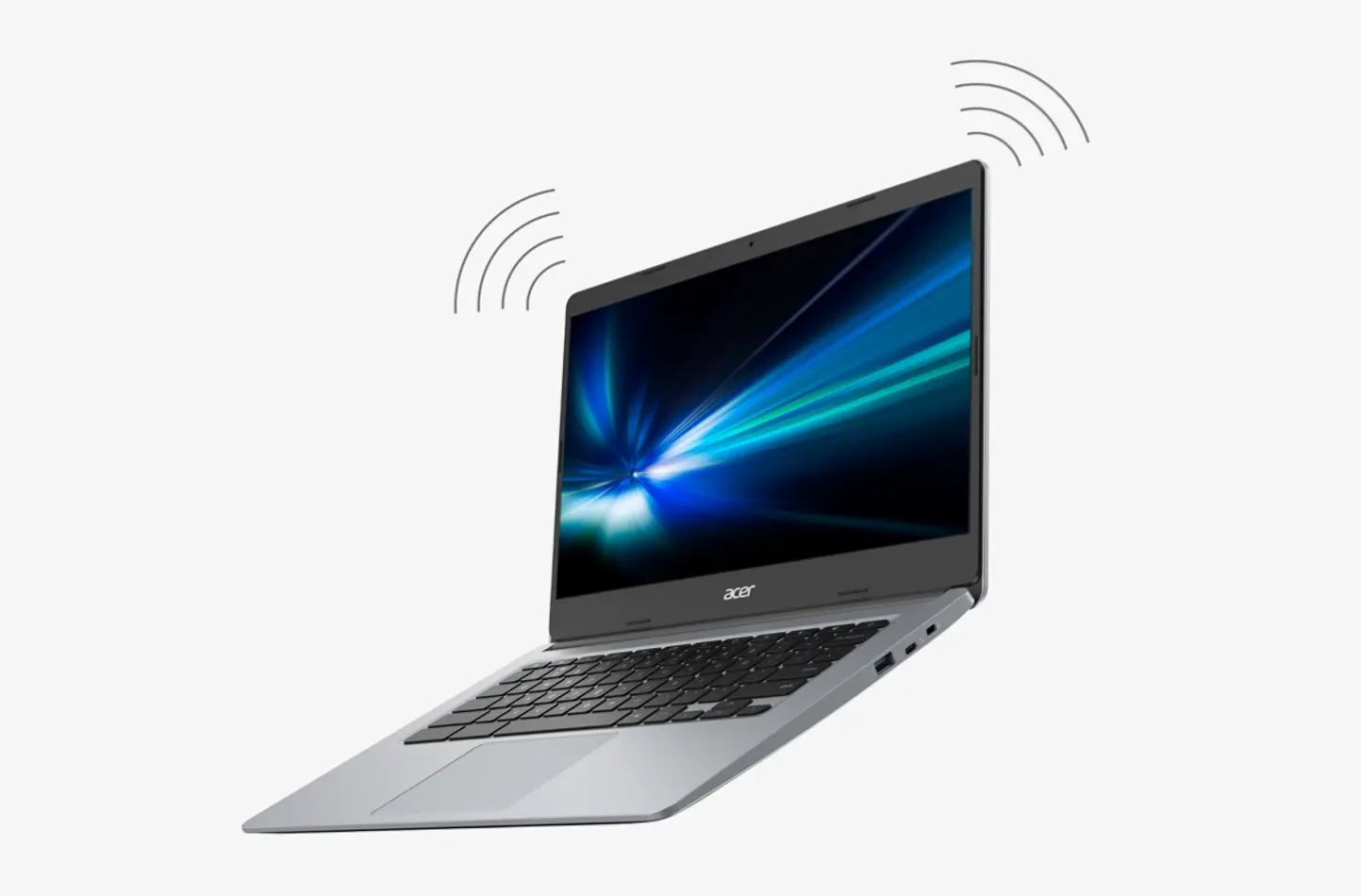
For those seeking an affordable option, Acer once again proves to be a reliable choice with the CB314, priced at less than $500. Despite its budget-friendly tag, it boasts a respectable technical specification. Powered by an Intel Pentium Silver N5030 processor and accompanied by 8 GB of RAM, it offers a decent performance package. However, a drawback is the limited internal storage, capped at a 64 GB SSD, which may seem restrictive for a computer primarily intended for cloud-based usage.
While maintaining a relatively compact design for a 14-inch device, the overall finish doesn’t leave a lasting impression. The keyboard, in particular, is soft and lacks the pleasant feel one might desire. Connectivity is facilitated with 4 USB ports (including two in USB-C format), although the absence of an HDMI output is notable. A microSD reader rounds out the connectivity options, proving useful if you find yourself constrained by the limited SSD space.
Surprisingly, the CB314 excels in the battery department, offering an impressive autonomy of over twelve hours on a single charge. Another positive aspect is the use of a USB-C socket, allowing for the exchange of the provided large power block for a more compact alternative.
Lenovo IdeaPad Duet Chromebook (2020): A Surprising Chromebook Tablet
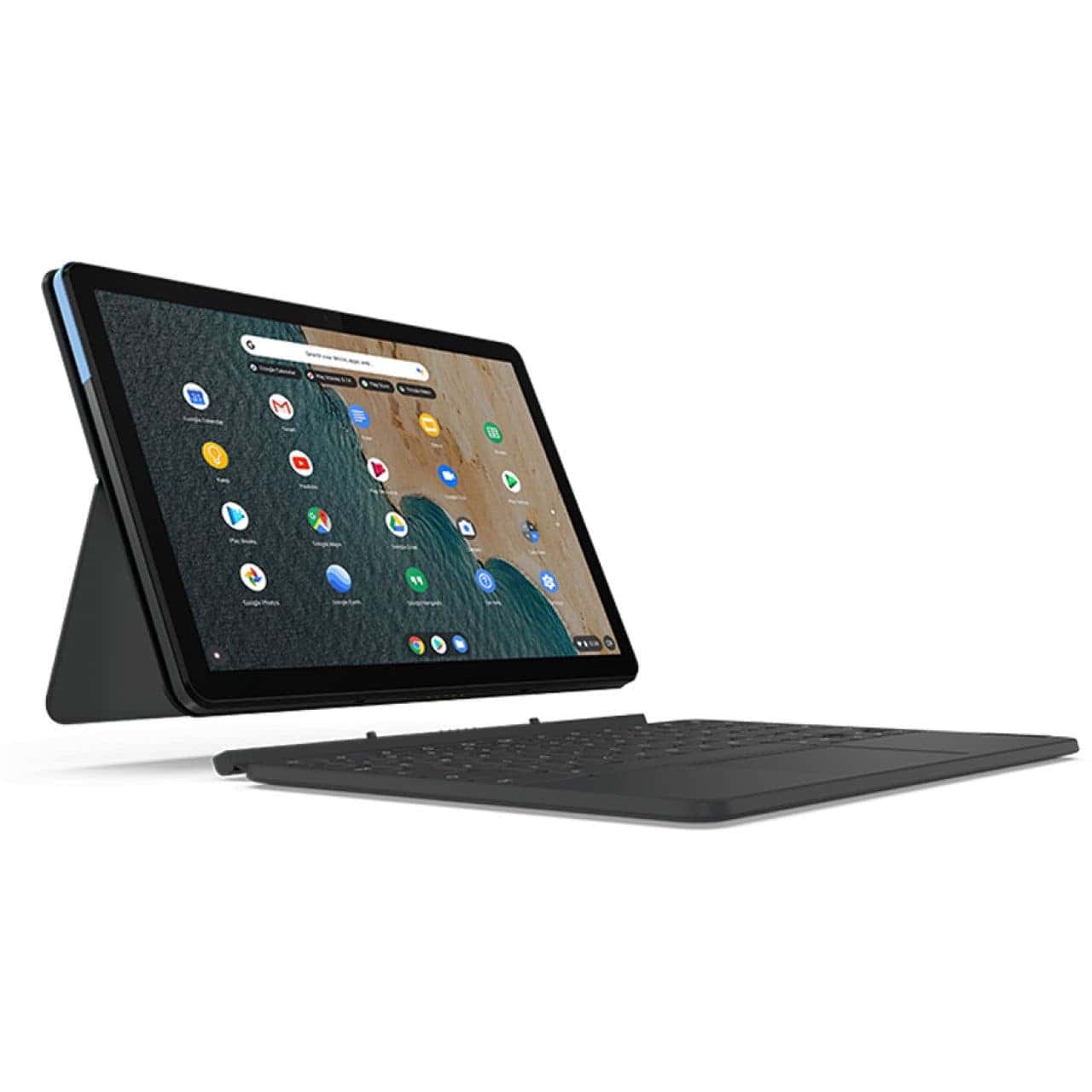
Shifting the spotlight from Acer, Lenovo introduces a distinctive option in the Chromebook realm with the IdeaPad Duet. Unlike the majority of Chromebooks adhering to the conventional laptop design, this model stands out as a hybrid, embracing the form factor of a tablet. Despite its notably affordable price, the compact machine comes bundled with a detachable keyboard and a protective cover that doubles as a kickstand.
While it may not reach the pinnacle of quality seen in an iPad Pro with its Magic Keyboard, the IdeaPad Duet and its accompanying keyboard exhibit a commendable finish. However, the keyboard and touchpad’s compact size might pose challenges, and it’s not designed for crafting the next Goncourt-winning novel.
The tablet-like configuration of this device allows it to fully capitalize on Chrome OS’s compatibility with Android apps. The system seamlessly transitions between tablet and laptop modes upon connecting the keyboard. Powering this versatile device is a MediaTek P60 chip, suitable for light office tasks but revealing limitations with more demanding applications. On the positive side, the battery life extends beyond 8 hours of usage.
Despite its inherent constraints, the IdeaPad Duet appeals to those with modest budgets seeking versatility in a Chromebook.
HP Chromebook x360 14: HP’s Versatile Chrome Laptop
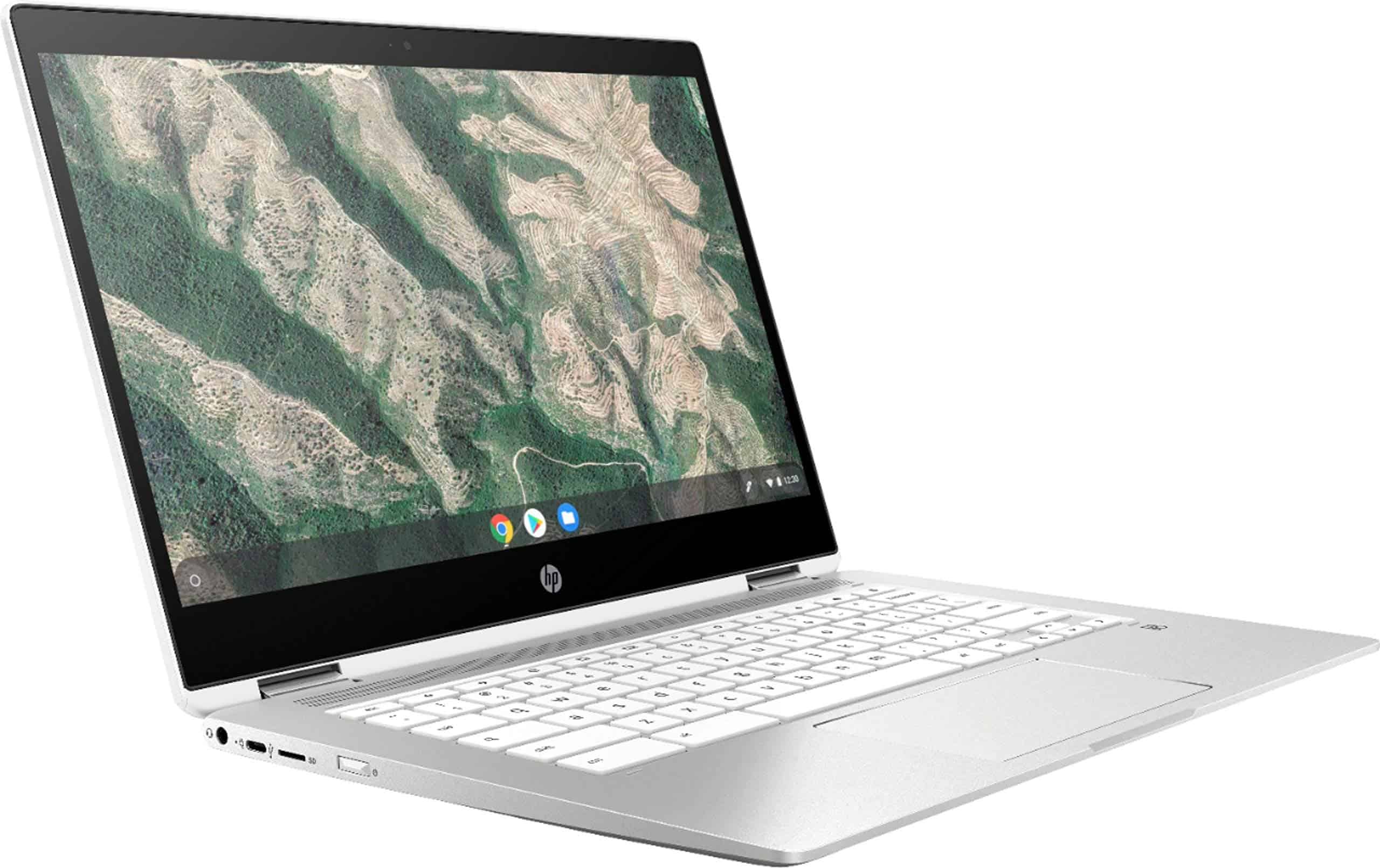
Gizchina News of the week
Following in the footsteps of Acer, HP introduces its flexible-hinged Chromebook, the HP Chromebook x360, available starting at $429 in its base configuration featuring an Intel Pentium chip. For those seeking more power, it can be upgraded to an i3 variant. It’s worth noting that, even in its upgraded versions, storage is capped at 128 GB.
The laptop boasts a 14-inch Full HD touchscreen display protected by Gorilla Glass, adding practicality to tablet-mode use, such as for drawing. Weighing in at almost 1.5 kg, it’s not the lightest, but its compact size makes it easy to slip into a bag. The device compensates for its weight with an impressive battery life of up to 11 hours and, notably, convenient fast charging. In its higher-end configurations, it also includes a fingerprint reader for enhanced security.
In terms of performance, the HP Chromebook x360 14 can be equipped with a potent Intel i3-1115G4 processor paired with 8 GB of RAM. This combination ensures smooth operation for office tasks and multimedia activities, providing users with a reliable and efficient computing experience.
Understanding ChromeOS and the Distinctions of Chromebooks
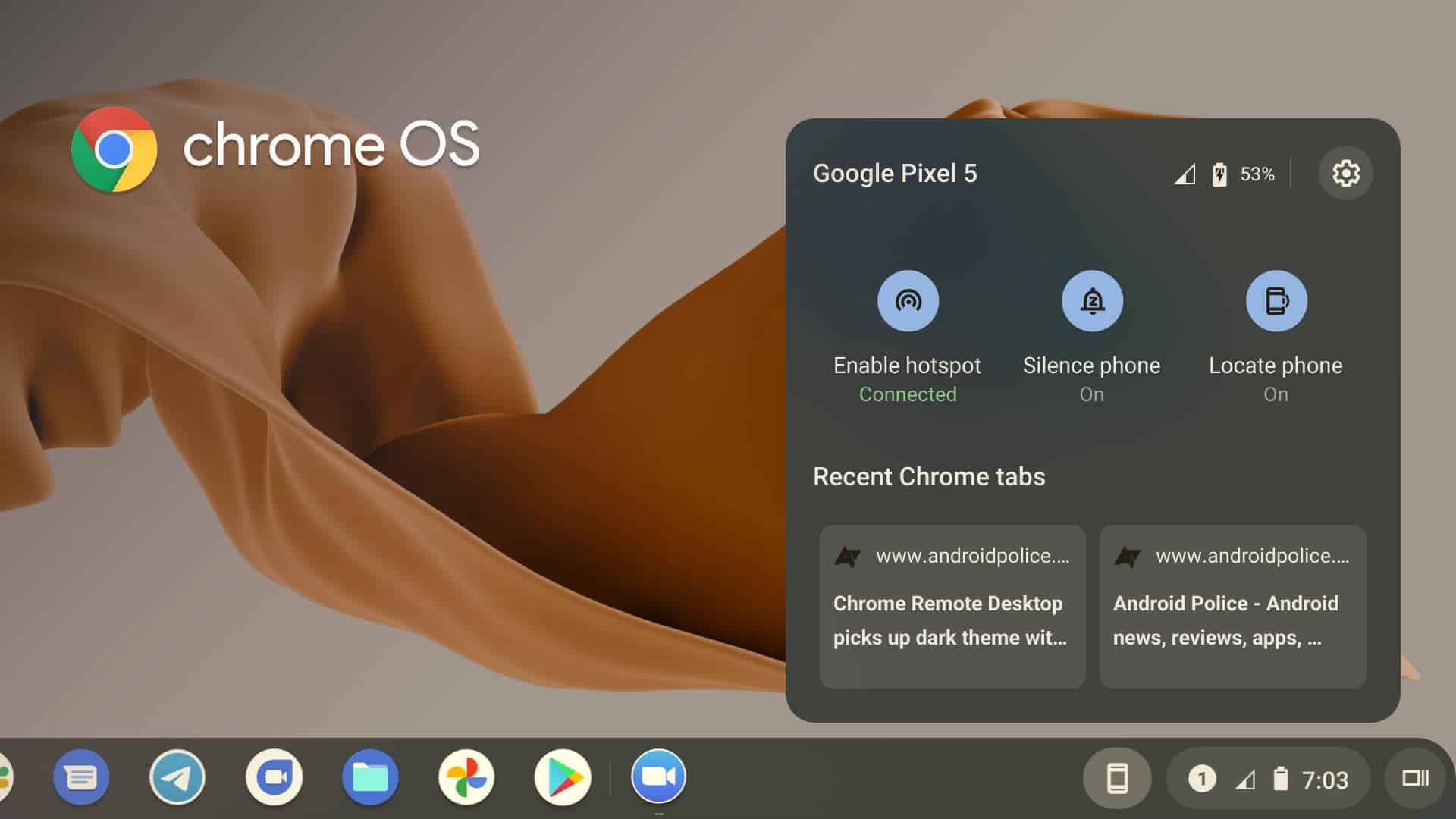
ChromeOS is an operating system developed by Google, centered around the Chrome web browser. Its design revolves around simplicity, speed, and efficiency. The key feature of ChromeOS is its integration with Google’s suite of web applications. Such as Google Docs, which functions as an equivalent to Microsoft Office. Notably, on a Chromebook, these applications can be utilized even without an active internet connection.
One of the notable strengths of ChromeOS lies in its economic use of system resources. Making it well-suited for devices with modest specifications. This efficiency allows Chromebooks to operate smoothly on machines with lighter hardware configurations. Additionally, ChromeOS facilitates a practical solution for limited storage capacity on the device. Most documents are synchronized with Google Drive. And the purchase of a Chromebook often includes an extra 100 GB of storage on Google Drive.
The primary distinction between a Chromebook and a traditional personal computer lies in the operating system. Unlike conventional PCs that typically run Windows or other desktop operating systems, Chromebooks exclusively operate on ChromeOS. This difference significantly influences the range of applications and software that can be used on a Chromebook. Since it does not support Windows applications, users need to consider their specific needs and compatibility requirements before opting for a Chromebook.
In summary, while Chromebooks excel in streamlined web-based tasks and are highly efficient, users should be mindful of the operating system’s limitations, especially if they rely on specific software or applications that may not be compatible with ChromeOS.
The Purpose of Chromebooks in a Nutshell
In essence, Chromebooks serve as compact and efficient devices primarily designed for portable office tasks, such as word processing and spreadsheet activities, through the Google suite of applications. They excel in providing seamless access to web content via the browser, including streaming services like Netflix, YouTube, and other online applications. However, running traditional PC games on a Chromebook is not supported.
One of the key advantages of Chromebooks is their affordability. Offering a cost-effective solution for users focused on productivity and online activities. The emphasis is on delivering a small, fast, and streamlined machine at a budget-friendly price point.
While originally limited in versatility, Chromebooks have evolved to become more adaptable. They now support the Play Store, enabling the installation of a wide range of Android apps. Enhancing their functionality beyond web-based tasks. Additionally, the integration of Google Assistant into Chrome OS allows users to execute commands through voice recognition with the familiar “OK Google.”
Furthermore, Chromebooks extend their capabilities into the realm of cloud gaming. With services like Nvidia GeForce Now making their mark on the ChromeOS platform. In summary, Chromebooks offer an efficient, affordable, and increasingly versatile option for users primarily engaged in web-centric and productivity-oriented tasks.
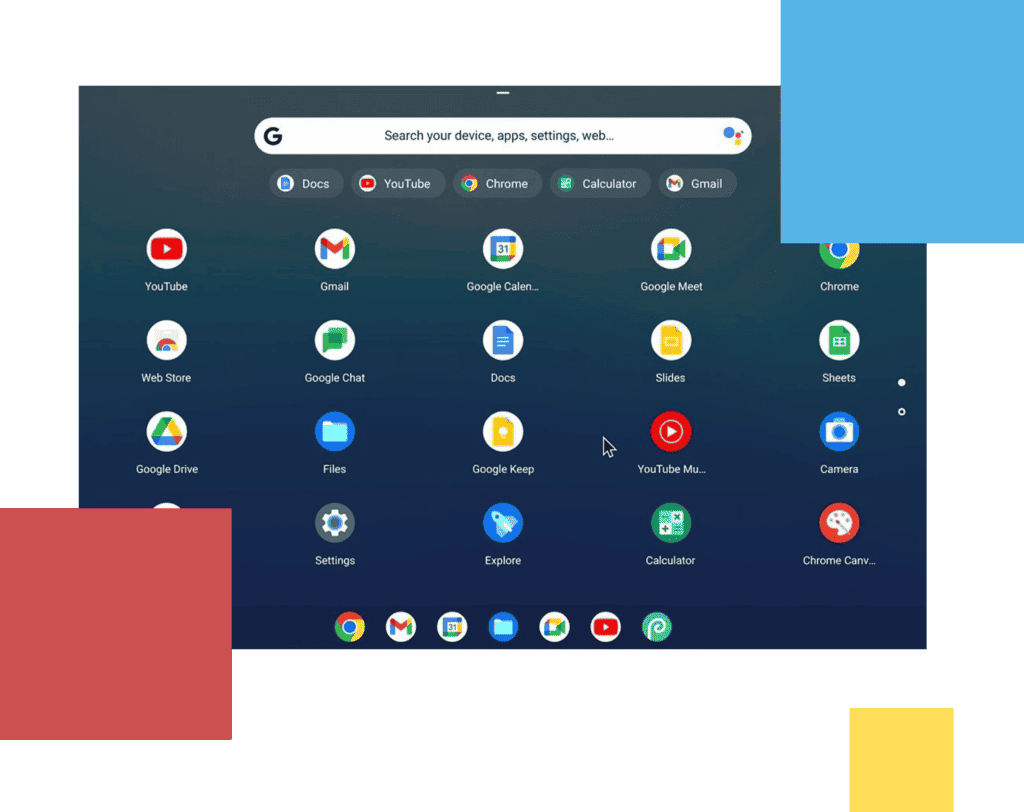
Update my Chromebook
ChromeOS, like any operating system, receives regular updates to enhance security, add new features, and improve overall performance. The duration of these updates, however, is contingent upon the release date of each Chromebook device.
Since 2020, Google has committed to providing 8 years of updates from the initial release date of a Chromebook. This extended update support ensures that users can benefit from the latest improvements and security patches for an extended period.
It’s important to note that Chromebooks released before 2020 may have different support timelines. And the end of support date can vary for each device. If you own a Chromebook released prior to 2020, it’s advisable to check Google’s official database on Chromebook end-of-life dates to ascertain the specific support duration for your device. This precaution helps users stay informed about the longevity of updates for their particular Chromebook model.
Does Microsoft Office work on ChromeOS?
As of my last knowledge update in January 2022, Microsoft Office is primarily accessed on ChromeOS through the web version rather than the Android app. The Android version of Microsoft Office was functional on ChromeOS for a period. But Microsoft had announced the end of support for ChromeOS.
To use Microsoft Office on a Chromebook, you can access the web version of Office applications through the browser. However, it’s important to note that the web version may lack some advanced features compared to the full desktop version. Microsoft has been continuously updating and improving its web-based Office applications. And while they provide a good experience for many tasks, users who rely on advanced features might find some limitations.
Since the software landscape can change, it’s recommended to check the latest information from Microsoft or the Chrome Web Store for the most up-to-date details on Microsoft Office compatibility with ChromeOS. Additionally, any changes or updates made by Microsoft after my last knowledge update in January 2022 would not be reflected in this response.
Can you use ChromeOS on any laptop?
As of my last knowledge update in January 2022, ChromeOS is typically designed and optimized for specific hardware configurations, known as Chromebooks. However, there are alternative ways to experience a ChromeOS-like environment on other laptops. Including older Windows PCs or Macs, using projects like Chromium OS or ChromeOS Flex.
ChromeOS Flex is a distribution based on Chromium OS, which is the open-source version of ChromeOS. Chromium OS can be run from a USB stick as a live environment or installed on the hard drive of a compatible device. This allows users to try out a ChromeOS-like experience on non-Chromebook hardware.
Keep in mind that not all hardware may be fully compatible, and the user experience may vary. Additionally, the availability of ChromeOS Flex and other Chromium OS distributions may have evolved since my last update. So it’s a good idea to check the latest information from official sources or community forums.
[ad_2]
Source link

Leave a Reply